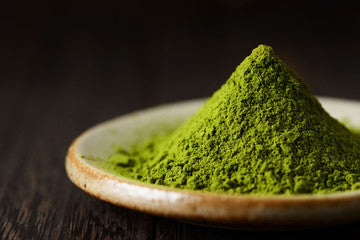
Once Medicine? Unveiling the Secrets of Matcha
Share
🌿 What Is Matcha?
When you think of matcha, you probably imagine a vivid green powder. Matcha is made by grinding young tea leaves (tencha) that were grown in the shade and steamed after harvesting. This method preserves a rich set of nutrients and results in its signature vibrant color and smooth taste.
In contrast, standard green tea (sencha) is made from sun-grown leaves that are steamed and rolled. The sunlight changes the flavor profile and nutrient content significantly.
🌍 A Global Trend With Ancient Roots
Matcha dates back to 2700 BCE in China's Yunnan Province, where it was originally consumed as a medicinal drink for the elite. Over time, it became more widely accessible and reached Japan by the 8th century, and Europe by the 16th.
Today, matcha is undergoing a global resurgence—and with good reason.
✅ Why Matcha Stands Out: You Drink the Whole Leaf
Unlike green tea, where leaves are steeped and discarded, matcha is consumed in powdered form. You ingest the entire leaf—making it a more nutrient-dense option.
“1 cup of matcha = multiple cups of green tea in antioxidants and nutrients.”
🍃 Matcha vs. Green Tea: The Core Differences
|
Feature |
Matcha |
Green Tea (Sencha) |
|
Growing method |
Shade-grown |
Sun-grown |
|
Processing |
Steamed, dried, then powdered |
Steamed, rolled leaves |
|
Flavor profile |
Umami-rich, slightly sweet |
Light, astringent |
|
Consumption |
Whole leaf (powder) |
Brewed and discarded |
💪 7 Proven Health Benefits of Matcha
1. 🛡️ Boosts Immunity
Catechins (especially EGCG) activate immune cells and fight viruses. Perfect for flu season.
2. 😌 Promotes Relaxation
Theanine reduces stress and offsets caffeine jitters—ideal for calming the mind.
3. 🔥 Aids in Weight Loss
Catechins block fat absorption and boost metabolism.
4. 🧬 Fights Oxidative Stress
High in antioxidants and Vitamin E—matcha helps combat aging and arterial damage.
5. 🌀 Supports Digestion
Rich in both soluble and insoluble fiber, it helps prevent diet-related constipation.
6. 😷 Reduces Bad Breath
Flavonoids in matcha neutralize odor-causing bacteria. Try it after meals!
7. 🧠 Slows Cognitive Decline
Studies show EGCG may delay dementia symptoms—especially when paired with fish in your diet.
☕ More Caffeine Than Coffee—But Milder?
Yes, matcha has more caffeine than coffee by weight—but the presence of theanine makes its effect more balanced. If coffee gives you jitters, matcha might be the smoother choice you didn’t know you needed.
“Matcha energizes the body while calming the mind.”
🎨 Creative Ways to Enjoy Matcha
· Traditional hot matcha
· Iced matcha drinks
· Matcha lattes with oat or almond milk
· Matcha smoothies or protein shakes
· Matcha pancakes or energy balls
